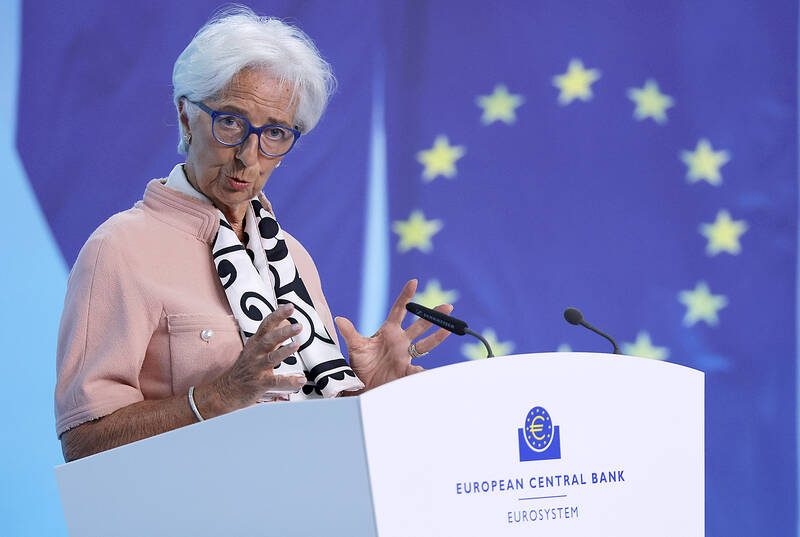The European Central Bank (ECB) cut interest rates yesterday for the seventh time to counter worries about economic growth fueled by US President Donald Trump’s tariff onslaught.
The bank’s move should support economic activity in the 20 countries that use the euro currency by making credit more affordable for consumers and businesses.
ECB President Christine Lagarde said at a post-decision news conference that “the major escalation in global trade tensions and the associated uncertainty will likely lower euro area growth by dampening exports.”

Photo: Ronald Wittek, EPA-EFE
“And it may drag down investment and consumption,” she said.
The bank’s rate-setting council decided at a meeting in Frankfurt to lower its benchmark rate by a quarter percentage point to 2.25 percent. The bank has been steadily cutting rates after raising them sharply to combat an outbreak of inflation from 2022 to 2023.
Now that inflation has fallen, growth worries have taken center stage. The economy in the 20 countries that use the euro grew a modest 0.2 percent in the final three months of last year. Inflation was 2.2 percent last month, close to the bank’s target of 2 percent.
The cut was widely expected by analysts given the sudden shadow cast over the eurozone’s growth outlook by Trump’s April 2 announcement of unexpectedly high tariffs on goods from other countries starting at 10 percent and ranging as high as 49 percent. The European Union faces a 20 percent tariff.
At the bank’s last meeting on March 6, Lagarde had raised the possibility of an upcoming “pause” in the bank’s series of rate cuts. But that option was practically eliminated by Trump’s announcement.
Trump has suspended the tariffs for 90 days, but the possibility of the 20 percent tariff rate he has proposed for Europe left economists and policymakers concerned that the higher costs will weigh on business activity and lead to slower growth or even a recession if he carries through.
Earlier yesterday, the Bank of Korea (BOK) held its interest rate steady at 2.75 percent, its third straight decision to keep rates unchanged after a 0.25 percentage point cut in February.
Given the “significant uncertainty” due to US tariffs and the government’s push for economic stimulus, “the board judged it appropriate to keep the base rate unchanged for now while closely assessing changes in domestic and external conditions,” the bank said.
BOK Governor Rhee Chang-yong said the decision was driven by tariff-related “uncertainty” going forward, which has grown to an “unprecedented level.”
“The intensity of US tariff policies and the swift shifts in responses from major economies are evolving so rapidly that it is currently difficult to even establish a baseline scenario for forecasts,” he said at a press conference in Seoul.
Rhee hinted that the board is considering additional cuts next month, but is “closely reviewing both domestic and external economic conditions.”
The country’s annual economic growth is expected to fall short of a recent forecast due to sweeping US tariffs and the fallout from the ex-president’s martial law declaration, he said.
“This year’s annual growth rate is now expected to fall short of the 1.5 percent forecast made in February,” Rhee said.
Additional reporting by AFP

PERSISTENT RUMORS: Nvidia’s CEO said the firm is not in talks to sell AI chips to China, but he would welcome a change in US policy barring the activity Nvidia Corp CEO Jensen Huang (黃仁勳) said his company is not in discussions to sell its Blackwell artificial intelligence (AI) chips to Chinese firms, waving off speculation it is trying to engineer a return to the world’s largest semiconductor market. Huang, who arrived in Taiwan yesterday ahead of meetings with longtime partner Taiwan Semiconductor Manufacturing Co (TSMC, 台積電), took the opportunity to clarify recent comments about the US-China AI race. The Nvidia head caused a stir in an interview this week with the Financial Times, in which he was quoted as saying “China will win” the AI race. Huang yesterday said

Nissan Motor Co has agreed to sell its global headquarters in Yokohama for ¥97 billion (US$630 million) to a group sponsored by Taiwanese autoparts maker Minth Group (敏實集團), as the struggling automaker seeks to shore up its financial position. The acquisition is led by a special purchase company managed by KJR Management Ltd, a Japanese real-estate unit of private equity giant KKR & Co, people familiar with the matter said. KJR said it would act as asset manager together with Mizuho Real Estate Management Co. Nissan is undergoing a broad cost-cutting campaign by eliminating jobs and shuttering plants as it grapples

The Chinese government has issued guidance requiring new data center projects that have received any state funds to only use domestically made artificial intelligence (AI) chips, two sources familiar with the matter told Reuters. In recent weeks, Chinese regulatory authorities have ordered such data centers that are less than 30 percent complete to remove all installed foreign chips, or cancel plans to purchase them, while projects in a more advanced stage would be decided on a case-by-case basis, the sources said. The move could represent one of China’s most aggressive steps yet to eliminate foreign technology from its critical infrastructure amid a

MORE WEIGHT: The national weighting was raised in one index while holding steady in two others, while several companies rose or fell in prominence MSCI Inc, a global index provider, has raised Taiwan’s weighting in one of its major indices and left the country’s weighting unchanged in two other indices after a regular index review. In a statement released on Thursday, MSCI said it has upgraded Taiwan’s weighting in the MSCI All-Country World Index by 0.02 percentage points to 2.25 percent, while maintaining the weighting in the MSCI Emerging Markets Index, the most closely watched by foreign institutional investors, at 20.46 percent. Additionally, the index provider has left Taiwan’s weighting in the MSCI All-Country Asia ex-Japan Index unchanged at 23.15 percent. The latest index adjustments are to